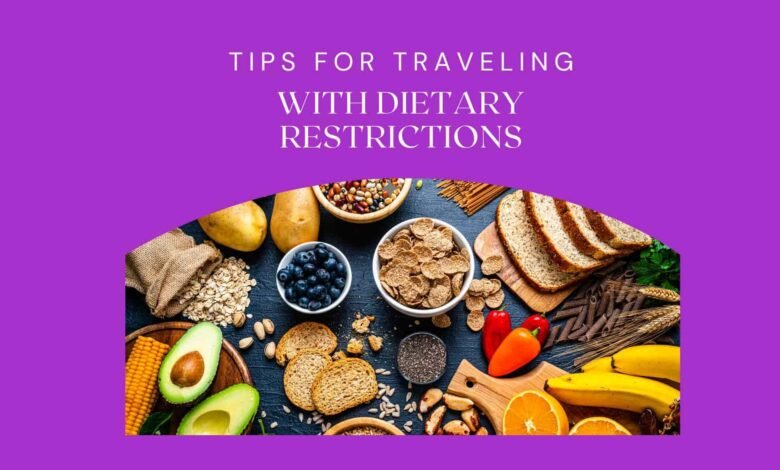
Traveling with dietary restrictions can be a daunting task, but with proper planning and preparation, it doesn’t have to hold you back from exploring the world. Whether you follow a gluten-free, vegan, halal, or kosher diet, or have specific food allergies, this comprehensive guide will help you navigate the challenges and ensure a smooth, enjoyable travel experience.
Understanding Your Dietary Needs Before embarking on your journey, it’s crucial to have a clear understanding of your specific dietary restrictions. Take the time to clarify whether you need to follow a gluten-free, vegan, halal, or kosher diet, or if you have any specific food allergies. Consulting with a healthcare professional before traveling can help you better understand your needs and prepare accordingly. Additionally, research your destination’s local cuisine and cultural norms to identify potential food options that align with your dietary requirements.
Planning and Preparation Research Your Destination
To ensure a smooth travel experience, thoroughly research your destination before departing. Investigate the local cuisine and dietary practices to identify potential challenges and opportunities. Utilize online resources, travel guides, and local forums to find restaurants and grocery stores that cater to your specific dietary needs. If you’re traveling to a country where language barriers may be an issue, learn key phrases related to your diet to help you communicate effectively with locals.
Packing Essential Items
When traveling with dietary restrictions, it’s essential to pack a variety of non-perishable snacks and meal replacements to keep you satiated during your journey. Consider bringing portable cooking equipment, such as a travel kettle or utensils, to prepare your meals when necessary. Don’t forget to pack any necessary medications or supplements related to your dietary needs.
Communicating Your Needs
To ensure your dietary needs are met throughout your trip, prepare translated cards or phrases explaining your restrictions in the local language. Contact airlines, hotels, and tour operators in advance to discuss accommodations and make any necessary arrangements. Joining online forums or support groups for travelers with similar dietary needs can provide valuable insights and advice from experienced travelers.
Navigating Transportation Air Travel
When booking flights, request special meals that cater to your dietary needs. However, it’s always a good idea to pack suitable snacks for long flights and layovers, as in-flight meals may not always meet your expectations. Familiarize yourself with TSA regulations regarding food items to avoid any issues at security checkpoints.
Train and Bus Travel
Research onboard dining options and policies for train and bus travel to determine if they can accommodate your dietary needs. Pack adequate meals and snacks for the journey, especially if you’re unsure about the availability of suitable food options. Identify any stops or stations along the way that may have restaurants or grocery stores that cater to your needs.
Road Trips
When planning a road trip, map out your route based on available food options. Pack a cooler with appropriate meals and snacks to ensure you have suitable food readily available. Research rest stops, gas stations, and grocery stores along the way that offer options that align with your dietary restrictions.
Accommodations and Dining
Choosing the Right Accommodation When selecting accommodations, opt for those that offer kitchen facilities, allowing you to prepare your meals. Research nearby grocery stores and markets to ensure you have access to ingredients that fit your dietary needs. Contact the hotel or hostel in advance to inquire about their ability to cater to your specific requirements.
Dining Out Use online resources, such as apps and websites, to find restaurants that cater to your dietary restrictions. When dining out, communicate your needs clearly to the restaurant staff, and don’t be afraid to ask questions about ingredients and preparation methods. Be open to trying new dishes that meet your dietary requirements, as this can lead to exciting culinary discoveries.
Cooking Your Meals
One of the best ways to ensure you have suitable food options is to cook your meals. Shop at local grocery stores or markets to find ingredients that fit your dietary needs. Prepare simple meals using portable cooking equipment, such as a travel kettle or hot plate. Experiment with local ingredients to create dishes that satisfy your taste buds while adhering to your dietary restrictions.
Staying Healthy and Safe Maintaining a Balanced Diet
While traveling with dietary restrictions, it’s crucial to ensure you’re getting a variety of nutrients from available food sources. Pack vitamin and mineral supplements if you’re concerned about potential deficiencies. Stay hydrated by drinking plenty of water and avoid excessive alcohol consumption, which can interfere with your body’s ability to absorb nutrients.
Preventing Cross-Contamination
To prevent cross-contamination, clearly communicate your needs to restaurant staff and travel companions. When possible, carry your own utensils and food containers to avoid any potential mix-ups. Be cautious of shared cooking spaces or buffet-style meals, as these can increase the risk of cross-contamination.
Handling Emergencies
Despite your best efforts, emergencies can happen. Pack emergency snacks and meal replacements in case you find yourself in a situation where suitable food options are scarce. Research local healthcare facilities and emergency services in advance, and carry a translated medical card detailing your dietary needs and any allergies.
Embracing the Experience
Traveling with dietary restrictions doesn’t mean you have to miss out on the joys of exploring new cultures and cuisines. Be open to trying new foods that meet your dietary requirements, and don’t be afraid to ask locals for recommendations. Connect with fellow travelers who share similar dietary needs to exchange tips and experiences. Document your food journey and share your discoveries with others to inspire and encourage travelers with dietary restrictions.
Conclusion
Traveling with dietary restrictions may require extra planning and preparation, but it’s entirely possible to have a fulfilling and enjoyable travel experience. By understanding your needs, researching your destination, packing essential items, and communicating effectively, you can navigate the world with confidence. Embrace the adventure, be open to new experiences, and don’t let your dietary needs hold you back from exploring all that the world has to offer.
FAQs
What should I do if I can’t find suitable food options at my destination?
If you’re having trouble finding suitable food options, try reaching out to local expat communities or online forums for recommendations. You can also consider booking accommodations with kitchen facilities, so you can prepare your meals using locally sourced ingredients.
How can I ensure that my dietary needs are met on long flights?
When booking your flight, request a special meal that caters to your dietary needs. However, it’s always a good idea to pack your own snacks and meal replacements in case the in-flight meals don’t meet your expectations or if there are any unexpected delays.
Are there any apps or websites that can help me find restaurants that cater to my dietary restrictions?
Yes, there are several apps and websites, such as Happy Cow, Gluten Free Travel Site, and Allergy Eats, that can help you find restaurants that cater to specific dietary needs. These resources often include user reviews and ratings, making it easier to find suitable dining options.
What should I pack in my carry-on to ensure I have enough safe food options during travel?
Pack a variety of non-perishable snacks, such as nuts, seeds, dried fruits, energy bars, and crackers that fit your dietary needs. If you have severe allergies, consider packing shelf-stable meal replacements or ready-to-eat meals that you know are safe for you to consume.
How can I communicate my dietary needs effectively in a foreign language?
Prepare translated cards or phrases that clearly explain your dietary restrictions in the local language. Include specific details about what you can and cannot eat, as well as any potential allergies. You can also use translation apps or online resources to help you communicate effectively with restaurant staff and locals.
What precautions should I take to avoid cross-contamination when eating out?
When dining out, clearly communicate your needs to the restaurant staff and ask about their food preparation methods. If you have severe allergies, consider carrying your own utensils and food containers to minimize the risk of cross-contamination. Be cautious of shared cooking spaces or buffet-style meals, as these can increase the risk of contamination.
How can I maintain a balanced diet while traveling with limited food options?
Focus on consuming a variety of nutrient-dense foods whenever possible, such as fruits, vegetables, whole grains, and lean proteins that fit your dietary needs. If you’re concerned about potential nutrient deficiencies, consider packing vitamin and mineral supplements to help fill any gaps in your diet.
What should I do if I have a severe allergic reaction while traveling abroad?
If you have a severe allergic reaction while traveling, seek medical attention immediately. Carry a translated medical card that details your allergies and any necessary medications, such as an EpiPen. Research local healthcare facilities and emergency services in advance, so you know where to go in case of an emergency.
Can I bring my food through airport security checkpoints?
Yes, you can bring your food through airport security checkpoints, but there are some restrictions. Solid foods can be transported in your carry-on or checked luggage, but liquids, gels, and aerosols must follow the TSA’s 3-1-1 rule. If you have any doubts, check with the TSA or your airline before traveling.
Are there any tour operators that specialize in catering to travelers with dietary restrictions?
Yes, there are several tour operators and travel companies that specialize in catering to travelers with specific dietary needs, such as vegan, gluten-free, or kosher. These companies often have experience in creating itineraries and accommodations that cater to your needs, making it easier for you to enjoy your travel experience without worrying about finding suitable food options.



